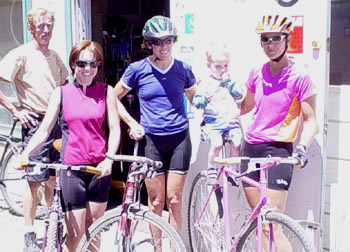[ 63XC.COM | HOWTO | SCORCHIN ]
Scorchin' for starters
Scorching rocks! The first scorchers in the world showed up in the US, late 19th century. They rode strong fixed gear bicycles on the road, on the trail, over hills and through parks. When we were looking for a word to describe riding a fixed gear bike offroad, we revived the old term. It sounded good! I love scorching, love my fixed gear. I love the stares and questions and funny looks from people on their hi-tech wonder machines when I give them an "on your left" and whizz by them on a climb. I love my geared bike too, but there is something transcendental about fixed gear. Setup One of the joys of scorching is that you don't need an expensive setup. Any old frame will do, as long as it fits well and has horizontal dropouts. I know scorchers on MTB frames and on old tourers with 700c wheels--whatever works for you! Whatever frame you choose, you will need a decent brake. Some roadie fixers ride brakeless, but that's not such a great idea on the trail. What happens if your feet get knocked out of the pedals? Have a strong brake up front. A V-brake is a good choice, or a dual-pivot caliper, as used by cycle tourists. Your gearing will usually be on the low side. Singlespeeders talk about 2:1 gearing, where the chainring is twice the size of the sprocket, putting your gear in the 50s. My own is at 63", but I know other scorchers pushing gears right up into the 70s. All kinds of bars work. We like inverted cruiser bars. They look like the ones you see in the old-time pictures, and they offer a couple of good hand positions. You'll want your feet attached to the bike. Toe clips are fine, but they're tricky to get into when you can't coast. I have a clipless platform pedal so I can scorch in my street shoes, ride to the coffee shop, or take that spontaneous tour. Finally, you might consider putting some BMX pegs on the rear axle. Why? Read on... Coasting Everyone knows you can't coast on a fixed gear bike, right? Wrong! If you can, take a look at pictures of cycle tourists in the late 19th century, before the freewheel was invented. Pay attention to the forks. Do you see those pegs, halfway down the fork blades? On a long downhill, the cyclist would rest their feet there, letting the pedals run away below them. That wasn't such a great idea in those days, but now that we have decent brakes it works pretty well. Stick your feet on the pegs and let the bike have its head. Don't try it on a technical downhill, tho'! Climbing How come scorchers often end up taking the lead on hills? Shouldn't the geared bike lead? Well, on a scorcher, you have to build speed, lots of it, to carry yourself over the top of the hill. Use the approach to the hill to gain the momentum you need to get over the top. Practice on a geared bike by choosing a middle gear and not allowing yourself to change it. We call this 'ramping up'. Skidding Skidding can be a good thing--at least, on a scorcher! It has to do with pedal clearance. A freewheel rider can keep a pedal high to skip a rock or treeroot, but a scorcher has to pedal through. Time it, skid in just the right spot and roll on by. Stopping One special skill for downhills is the "skid stop". Bunny-hop the rear wheel, then hold the cranks level with the ground until the rear wheel hits. The rear wheel skids for a second on contact. Don't try to keep the cranks still after the skid finishes, or you'll go over the bars and get a trip to the dentist! A quick skid, or a series of them, trims your speed pretty well. Practice Practice when you can. Loose gravel and snow are both good for getting your moves together. Work on your track stand, too--a scorcher can ghost through technical stuff at impossibly low speeds, but you need good balance. And have fun! [ TOP ] |
Writer
Jen Glick rides the hills and alleys of Crested Butte, Colorado on her purple steed "Scorch- ette".
Date
v1.0 written June 2002
Legal
As always, you ride your bike at your own risk. 63xc.com and Jennifer Glick will not be held liable for any damage or injury arising from use of this lesson.
Mailing list
Join the 63xc.com list.
